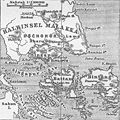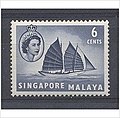Portal:Singapore
 Map of Singapore Singapore, officially the Republic of Singapore, is an island country and city-state in Southeast Asia. The country's territory comprises one main island, 63 satellite islands and islets, and one outlying islet. It is about one degree of latitude (137 kilometres or 85 miles) north of the equator, off the southern tip of the Malay Peninsula, bordering the Strait of Malacca to the west, the Singapore Strait to the south along with the Riau Islands in Indonesia, the South China Sea to the east, and the Straits of Johor along with the State of Johor in Malaysia to the north.
In its early history, Singapore was a maritime emporium known as Temasek and subsequently a major constituent part of several successive thalassocratic empires. Its contemporary era began in 1819, when Stamford Raffles established Singapore as an entrepôt trading post of the British Empire. In 1867, Singapore came under the direct control of Britain as part of the Straits Settlements. During World War II, Singapore was occupied by Japan in 1942 and returned to British control as a Crown colony following Japan's surrender in 1945. Singapore gained self-governance in 1959 and, in 1963, became part of the new federation of Malaysia, alongside Malaya, North Borneo, and Sarawak. Ideological differences led to Singapore's expulsion from the federation two years later; Singapore became an independent sovereign country in 1965. After early years of turbulence and despite lacking natural resources and a hinterland, the nation rapidly developed to become one of the Four Asian Tigers. As a highly developed country, it has one of the highest PPP-adjusted GDP per capita. It is also identified as a tax haven. Singapore is the only country in Asia with a AAA sovereign credit rating from all major rating agencies. It is a major aviation, financial, and maritime shipping hub and has consistently been ranked as one of the most expensive cities to live in for expatriates and foreign workers. Singapore ranks highly in key social indicators: education, healthcare, quality of life, personal safety, infrastructure, and housing, with a home-ownership rate of 88 percent. Singaporeans enjoy one of the longest life expectancies, fastest Internet connection speeds, lowest infant mortality rates, and lowest levels of corruption in the world. It has the third highest population density of any country, although there are numerous green and recreational spaces as a result of urban planning. With a multicultural population and in recognition of the cultural identities of the major ethnic groups within the nation, Singapore has four official languages: English, Malay, Mandarin, and Tamil. English is the common language, with exclusive use in numerous public services. Multi-racialism is enshrined in the constitution and continues to shape national policies. Singapore is a parliamentary republic and its legal system is based on common law. While the country is de jure a multi-party democracy with free elections, the government under the People's Action Party (PAP) wields widespread control and political dominance. One of the five founding members of ASEAN, Singapore is also the headquarters of the Asia-Pacific Economic Cooperation Secretariat, the Pacific Economic Cooperation Council Secretariat, and is the host city of many international conferences and events. Singapore is also a member of the United Nations, the World Trade Organization, the East Asia Summit, the Non-Aligned Movement, and the Commonwealth of Nations. (Full article...)Selected article - There are three general sources of Singapore law: legislation, judicial precedents (case law), and custom. Legislation is divided into statutes and subsidiary legislation. Statutes are written laws enacted by the Singapore Parliament, as well as by other bodies that had power to pass laws for Singapore in the past. Statutes enacted by these other bodies may still be in force if they have not been repealed. One particularly important statute is the Constitution of the Republic of Singapore, which is the supreme law of Singapore. Any law the Legislature enacts after the commencement of the Constitution that is inconsistent with it is, to the extent of the inconsistency, void. Subsidiary legislation, also known as "delegated legislation" or "subordinate legislation", is written law made by ministers or other administrative agencies such as government departments and statutory boards under the authority of a statute (often called its "parent Act") or other lawful authority, and not directly by Parliament. (Full article...) Selected picture Biopolis, a research and development centre for biomedical sciences located at one-north in Buona Vista, Singapore. Read more... General imagesThe following are images from various Singapore-related articles on Wikipedia.
Selected biography -Laurentia Tan Yen Yi BBM PBM (/lɒˈrɛnʃə/ lo-REN-shə; Chinese: 陈雁仪; pinyin: Chén Yànyí, pronounced [tʂə̌n jɛ̂n í]; born 24 April 1979), is a Singaporean para-equestrian competitor. Tan developed cerebral palsy and profound deafness after birth, and moved to the United Kingdom with her parents at the age of three. She took up horse riding aged five years as a form of physiotherapy. She subsequently completed her A-levels at the Mary Hare Grammar School, a residential special school for the deaf, and graduated with an honours degree from Oxford Brookes University in hospitality management and tourism. In March 2007, the Riding for the Disabled Association Singapore (RDA) invited Tan to join the Singapore team for the World Para Dressage Championships at Hartpury College in Hartpury, Gloucester, in England in July that year. At this event, her first international competition, she did well enough to qualify for the 2008 Paralympic Games. In September 2008, at the Hong Kong Olympic Equestrian Centre at Sha Tin, she achieved bronze medals in the Individual Championship and Individual Freestyle Tests (class Ia). These were Singapore's first Paralympic medals and Asia's first equestrian medals at the Paralympic Games. Tan was conferred the Pingat Bakti Masyarakat (Public Service Medal) by the President of Singapore at a ceremony at the Istana Singapore on 20 September 2008. (Full article...) Did you know (auto-generated)
In this month
More did you know -
Selected panoramaA night time view of Bishan Park after its renovation under the Active, Beautiful, Clean Waters (ABC Waters) Programme. Singapore topicsRelated portalsSoutheast Asia Other Countries Tasks
CategoriesWikiprojectsAssociated WikimediaThe following Wikimedia Foundation sister projects provide more on this subject:
Discover Wikipedia using portals |































































